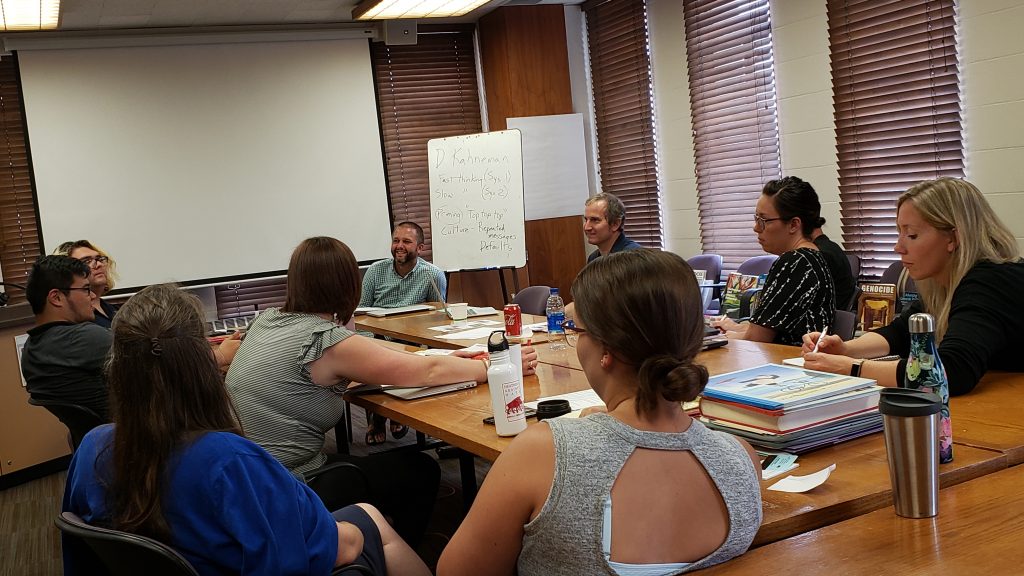“Why have we never learned about this before?” This question is repeatedly asked by the high school juniors and seniors in my comparative genocide studies elective course, often with a tone of disbelief and urgency. While all have studied the Holocaust, only a few have learned about the genocides in Armenia and Rwanda, and rarely are students aware of the genocides that took place in German Southwest Africa (present-day Namibia), Cambodia, Darfur, or the many other so-called “hidden” genocides that we study. However, they are shocked and often angry when we examine the genocide perpetrated against Indigenous peoples in North America, especially the Dakota and Ojibwe nations in the State of Minnesota; “we should have learned about this before,” students say. As their teacher, I couldn’t agree more.
Indeed, as a social studies teacher and as a Ph.D. candidate in social studies education at the University of Minnesota studying genocide education, I am encouraged to see that the recently-released draft of the proposed 2021 state social studies standards contains several references to both settler colonialism and Indigenous genocide, specifically the “genocide that occurred in the past within the land that is Minnesota today.” Such language does not appear anywhere in the current social studies standards implemented in 2011. The revisions are proposed by a standards review committee composed of a diverse group of 44 educators and community members. The Minnesota Department of Education is required by law to review and revise state teaching standards every ten years.
Recognizing what many Dakota scholars, such as Chris Mato Nunpa and Waziyatawin, have been saying for years, the city councils of Minneapolis and St. Paul passed resolutions on the sesquicentennial of the U.S.-Dakota War acknowledging the genocide of the Dakota. The Minnesota Historical Society has also begun to use the term genocide in relation to the state’s history. Through my research and professional development work with educators, I have found that, in recent years, a small but growing number of social studies teachers have taken up settler colonialism and genocide frameworks in their classrooms. It is long overdue that the social studies standards reflect these shifts and promote a more truthful telling of Minnesota’s history.

While I welcome these changes to the standards, unfortunately, the three references to the Holocaust and genocide that appeared in the 2011 social studies standards have been dropped from the initial draft of the proposed 2021 standards. I urge the committee to reinstate references to the Holocaust and other twentieth and twenty-first century genocides in the 2021 standards. Minnesota students must have opportunities to learn about the histories and legacies of genocide in both Minnesota and around the world.
Genocide education has the potential to be transformative for individual students and whole communities and societies. Such education highlights the harmful effects of prejudice, racism, and discrimination while engendering attitudes of tolerance and underscoring the importance of standing up to and speaking out against acts of intolerance. Genocide education develops awareness of national and international institutions, laws, and norms, especially human rights, and raises awareness of pluralism and the value of diversity within a democracy. Genocide education also underscores how communities and societies that have been affected by genocide and mass violence – including many communities in Minnesota, such as the Armenian, Cambodian, Jewish, and Ukrainian communities – have engaged in healing, seeking justice, education, and preserving culture and memory through recognition, commemoration, and memorialization efforts.
In addition, the inclusion of language around Indigenous genocide and settler colonialism in the 2021 draft standards serves as a call for truth-telling in social studies classrooms regarding the histories and legacies of colonialism, genocide, and the continued violence against Indigenous people and communities. Such truth-telling can serve as a step towards justice, reparation, and healing within society. Indeed, to our north, Canada and the Province of Manitoba, which have more widely acknowledged their national and local histories of colonialism and genocide, have made changes to social studies education that might serve as a model for Minnesota.
However, it is also important to recognize the limits of the proposed changes to the standards. While the changes to the language in the standards are essential, much work still needs to be done to create and update curricula, equip practicing teachers, and educate aspiring teachers to bring genocide education, especially the difficult histories and legacies of genocide in Minnesota, into the state’s social studies classrooms.
The public can comment on the first draft of the proposed social studies standards between now and January 4 through an online survey and series of virtual town halls organized by the Minnesota Department of Education.
George Dalbo is a high school social studies teacher and Ph.D. candidate in Social Studies Education in the Department of Curriculum and Instruction at the University of Minnesota. He previously served as Educational Outreach Coordinator for the Center for Holocaust and Genocide Studies. He is currently a part of the CHGS team researching education as a form of reparative justice in Minnesota & Manitoba, a Human Rights Lab funded project.

Comments 1
Securing and Expanding Holocaust and Genocide Education in Minnesota - Center for Holocaust & Genocide Studies — August 10, 2021
[…] Genocide Studies and the Jewish Community Relations Council of Minnesota and the Dakotas (JCRC), I lobbied MDE to reinstate and expand Holocaust and genocide studies, while also supporting efforts to […]